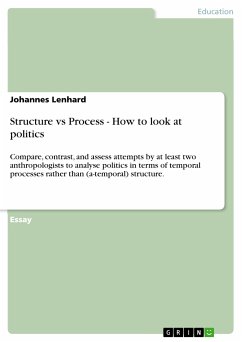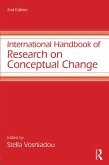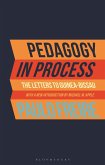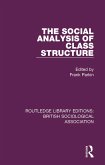Essay from the year 2012 in the subject Pedagogy - Science, Theory, Anthropology, grade: 65, University of Cambridge, language: English, abstract: Compare, contrast, and assess attempts by at least two anthropologists to analyse politics in terms of temporal processes rather than (a-temporal) structure. Edmund Leach published his account of the Kachin society in Highland Burma in 1954, fourteen years after Evans-Pritchard's and Fortes' classical structural-functionalist collection on 'African Political Systems'. Only four years after Leach, Barth's 'Swat Pathans' enters the debate. Both Barth and Leach differ remarkably in their methodological approach fousing on change and process. While Radcliffe-Brown (Fortes & Evans-Pritchard, 2006:vi) proclaims in his preface to 'African Political Systems' that the aim of anthropology is to "discover the universal, essential, characters which belong to all human societies, past, present and future", Leach (Leach, 2004) heavily criticises the implicit underlying assumption of equilibrium. Instead, he focuses on the study of the "constantly changing environment" and society as "a process in time" (ibid.:5). As I will argue his process is still very much structural, however. In contrast to structure, Barth makes individual action his centre piece that aggregates to higher political levels in temporal processes. In the following analysis, I will complement my analysis of the two core texts mentioned above with methodological writings comparing Barth's and Leach's account of political processes in Pakistan and Burma respectively.
Dieser Download kann aus rechtlichen Gründen nur mit Rechnungsadresse in A, B, BG, CY, CZ, D, DK, EW, E, FIN, F, GR, HR, H, IRL, I, LT, L, LR, M, NL, PL, P, R, S, SLO, SK ausgeliefert werden.









